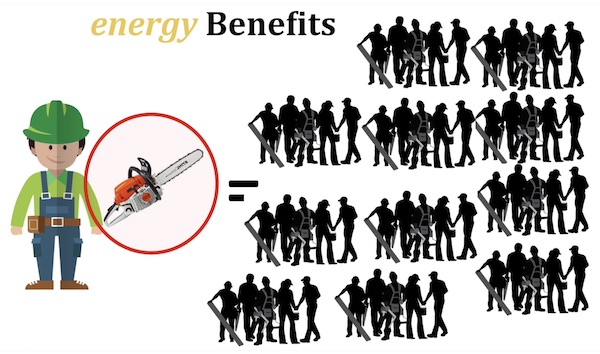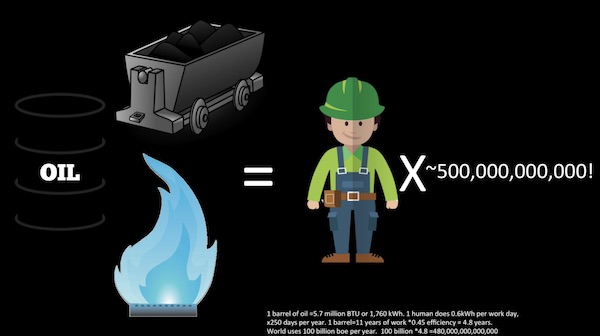
Rembrandt van Rijn Landscape With the Rest on the Flight into Egypt 1647
Hmm, energy. Is it a good idea I be drawn back into the subject? We used to do so much on the topic, Nicole Foss and I, in the first years of The Automatic Earth, and before that at the brilliant Oil Drum, where we had all those equally brilliant oil professionals to guide us on. So why revisit it? Well, for one thing, because a friend asked.
And for another because things -may have – changed over the past 15 years or so. Not that I think the peak oil idea, which is that we reached the peak in 2005 or so, changed. Yeah, unconventional oil, shale, fracking etc., came about, but that has nothing to do with peak oil. Just look at the EROEI (energy return) you get from shale. You go from 100:1 to, if you’re lucky, 5:1. You can’t build a complex society on that.
It’s not an accident that shale oil firms are going broke all over; even ultra low interest rates can’t save them. But all that still doesn’t come close to scratching the surface of our energy -or oil, for that matter.- conundrum.
I’ve never understood what the idea behind the Extinction Rebellion is. Or, you know, that they know what they’re talking about. Do they know the physics?
The general idea, yeah, but not how they aim to reach their goals. Far as I can tell, it’s about less CO2 -and methane, supposedly- emissions, but I don’t get how they want to achieve that. I’ve read some but not all of their theories, and it’s not obvious. It feels like they want less of various things, only to replace them with something else. Like they think once oil is gone, you can put wind and solar in its staid, and off we go. Tell me how wrong I am. Please do.
I have the same with the various Green New Deals. What do they want? How do they aim to achieve their lofty goals? I looked at the Wikipedia page for a Green New Deal, and it tells me it’s an American thing, “invented” recently by Alexandria Ocasio-Cortez and some other people. But I know that’s not true, because other people had the same idea with the same name in the UK 10-12 years ago.
And then Yanis Varoufakis also has a thing he labels “Green New Deal”, a global one no less, but in a recent article, I didn’t get many specifics of that either.
Let’s go with AOC and friends’ points as Wikipedia lists them:
“Guaranteeing a job with a family-sustaining wage, adequate family and medical leave, paid vacations, and retirement security to all people of the United States.”
What’s not to love?
“Providing all people of the United States with (i) high-quality health care; (ii) affordable, safe, and adequate housing; (iii) economic security; and (iv) access to clean water, clean air, healthy and affordable food, and nature.”
I’m in.
“Providing resources, training, and high-quality education, including higher education, to all people of the United States.”
Sure, Why only the US though?
“Meeting 100 percent of the power demand in the United States through clean, renewable, and zero-emission energy sources.”
Now, wait, there are no zero-emission sources. And none that are fully renewable.
“Repairing and upgrading the infrastructure in the United States, including by eliminating pollution and greenhouse gas emissions as much as technologically feasible.”
Okay, yeah. But what does “The Infrastructure” mean? Is that just power lines, or does it include all roads, highways etc.?
“Building or upgrading to energy-efficient, distributed, and smart power grids, and working to ensure affordable access to electricity.”
Right. Great. Sounds good. Where would the electricity come from, though? From so-called zero-emission sources., which don’t exist?
“Upgrading all existing buildings in the United States and building new buildings to achieve maximal energy efficiency, water efficiency, safety, affordability, comfort, and durability, including through electrification.”
Not sure I like the term “Electrification” in there, but yeah, bring it on. The term “Upgrading” is not what we use, however, we say “Retrofitting”.
“Overhauling transportation systems in the United States to eliminate pollution and greenhouse gas emissions from the transportation sector as much as is technologically feasible, including through investment in (i) zero-emission vehicle infrastructure and manufacturing; (ii) clean, affordable, and accessible public transportation; and (iii) high-speed rail.”
Now you’re getting serious. But what does this mean? We already covered the zero-emission thing, that’s obvious nonsense, but how about public transportation? Do you envision closing down cities to cars? Or do you actually think electric cars are zero emission? Alternatively, do you know they’re not but you use the word regardless?
“Spurring massive growth in clean manufacturing in the United States and removing pollution and greenhouse gas emissions from manufacturing and industry as much as is technologically feasible.”
Sure, if you want to clean up your environment, “Spurring Massive Growth” is just what you want to hear. Good lord.
“Working collaboratively with farmers and ranchers in the United States to eliminate pollution and greenhouse gas emissions from the agricultural sector as much as is technologically feasible.”
Call me nuts, and I have no reason to believe you haven’t already, but the no.1 thing that has to vanish from US Ag is not pollution or emissions but the chemicals used to kill all other life so that your lettuce can grow. And don’t get me started on antibiotics or the creatures they are used on.
That, Green New Deal, may be your biggest fault line. But you know, overall, you give me the idea that you don’t understand the territory you’re operating in. You’re just saying stuff that you think people will believe in and follow. Like Trump or Hillary or any politicians do.
Best rest assured, we haven’t even started yet. There’s still the trifle little matter of how all systems, all organisms, deal with energy (sources). Now, according to Alfred J. Lotka and Howard T. Odum, in what they and others have labeled the 4th law of Thermodynamics, all systems and organisms of necessity (DNA/RNA driven) seek to maximize their use of energy, for pure survival reasons: the one that’s most efficient in its ability to exploit and utilize -external- energy sources will survive. (another word for this is: Life)
And then you say you must use less energy? Or you want to shift from oil to energy sources with less density, like solar or wind? Be careful, because this says you’re putting your odds of survival at risk.
This is what my teacher Jay Hanson, who tragically died earlier this year before I ever had the chance to meet him, said about this in 2013:
Today, when one observes the many severe environmental and social problems, it appears that we are rushing towards extinction and are powerless to stop it. Why can’t we save ourselves? To answer that question we only need to integrate three of the key influences on our behavior: 1) biological evolution, 2) overshoot, and 3) a proposed fourth law of thermodynamics called the “Maximum Power Principle” (MPP). The MPP states that biological systems will organize to increase power generation, by degrading more energy, whenever systemic constraints allow it.
Biological evolution is a change in the properties of populations of organisms that transcend the lifetime of a single individual. Individual organisms do not evolve. The changes in populations that are considered evolutionary are those that are inheritable via the genetic (DNA/RNA, etc.) material from one generation to the next.
“Natural selection” is one of the basic mechanisms of evolution, along with mutation, migration, and drift. Natural selection explains the appearance of design in the living world, and “inclusive fitness theory” explains what this design is for. Specifically, natural selection leads organisms to become adapted as if to maximize their inclusive fitness. The “fittest” individuals are those who succeed in generating more power and reproducing more copies of their genes than their competitors.
You’re in tricky territory, guys. Reversing the history of (wo)mankind or the system that gave birth to her/him is not easy. Perhaps not impossible, but certainly very hard. You’d have to go against the DNA/RNA embedded in you, and then rephrase it at a molecular level. Like you all, I have certain -perhaps illogical- hopes that it can be done, but my hopes are not high. How do you beat nature? And would you really want to if you could?
There’s so much more to say on the topic of energy, but if you’ll excuse me, I’ll leave it at this for now. I’ll get back to it soon. Of course I understand that the jump from Greta and AOC to “Maximum Power Principle” is a big one, but for some people perhaps that’s just what they need. And for others it’s not, I get that. But it’s still what it is.
Note: nowhere in the Green New Deal et al do I see that we should do less, use less, move less, but shouldn’t that be the no.1 priority? Build gadgets, cars, homes, cities, that use much less energy? Retrofit everything to use 90% less energy?
The thing about that is, however, that it appears to violate the Maximum Power Principle. See what I’m getting at?












